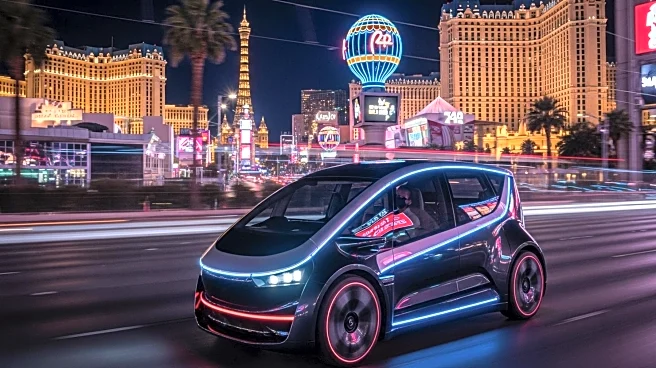What's Happening?
Zoox, an Amazon subsidiary, has launched its robotaxi service on the Las Vegas Strip, providing free rides to the public. The service is accessible through the Zoox app, available on iOS and Android devices. Zoox's robotaxis are uniquely designed without a driver's seat, steering wheel, or brake pedals, featuring rows of seating that face each other to enhance rider interaction. The company can produce up to 10,000 vehicles annually at its production facility. Zoox is also testing its robotaxis in San Francisco and Foster City, with plans to expand testing to Austin and Miami. The service aims to transform the ride-hailing experience, making it more delightful and accessible.
Why It's Important?
The launch of Zoox's robotaxi service marks a significant advancement in the autonomous vehicle industry, potentially revolutionizing urban mobility. By offering free rides initially, Zoox aims to familiarize the public with its service and gather feedback for future improvements. This development could lead to increased competition in the ride-hailing market, challenging established players like Uber and Lyft. Additionally, the introduction of driverless vehicles may impact employment in the transportation sector, as well as raise questions about safety and regulatory standards. The success of Zoox's service could accelerate the adoption of autonomous vehicles in other cities, influencing urban planning and public transportation policies.
What's Next?
Zoox plans to expand its service by adding more destinations on the Las Vegas Strip and introducing paid rides once regulatory approval is secured. The company is also preparing to test its robotaxis in Austin and Miami, which could lead to further expansion of its service. As Zoox gathers feedback from riders, it may refine its app and vehicle design to enhance the user experience. The broader autonomous vehicle industry will likely monitor Zoox's progress, potentially leading to increased investment and innovation in the sector. Stakeholders, including city planners and policymakers, may need to address infrastructure and regulatory challenges associated with the widespread adoption of robotaxis.
Beyond the Headlines
The launch of Zoox's robotaxi service raises ethical and legal considerations regarding the use of autonomous vehicles. Issues such as data privacy, liability in case of accidents, and the impact on public transportation systems may require careful examination. Additionally, the cultural shift towards driverless vehicles could influence societal attitudes towards technology and automation. Long-term, the success of Zoox's service may contribute to a reduction in traffic congestion and emissions, promoting sustainable urban development. As autonomous vehicles become more prevalent, there may be a need for new regulations and standards to ensure safety and reliability.











